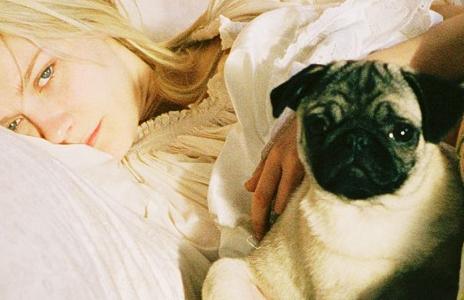Okay, it’s official, I hate Sofia Coppola. Well, ‘hate’ might be too strong a word. After all, the Coppola dauphine is too harmless and insignificant to inspire more than mild displeasure. You need to be offensively wrong-minded like a Larry Clark or a Catherine Breillat to warrant hatred. No, I don’t hate la Sofia. She’s just a well-intentioned young woman with a good visual sense and impeccable taste in music, but precious little writing skills. Give her a great screenplay by someone else like, say, Tarantino (word is they’re already chummy) and I’m sure she could make it into a great film. But if she’s left to her own devices with the kind of thin, inconsequential material she’s been working from so far, she’ll keep making these aptly crafted, perfectly vapid little films. She’s the arthouse Tony Scott.
At least with Lost in Translation, she had Bill Murray improvising a bunch of funny lines – not to mention Scarlett Johansson coming into her own as a sex bomb. In “Marie Antoinette”, she still has a hot blonde to distract us somewhat from the fact that nothing’s going on, the lovely Kirsten Dunst (who also brought her élan vital to Coppola’s otherwise equally empty “The Virgin Suicides”). But while one could expect Jason Schwartzman to provide some much needed humor, Murray-style, he’s only mildly amusing here.
Incomprehensibly, there are some folks who have and will praise “Marie Antoinette”. Maybe they’re still buying into Coppola’s deceiving facade of thoughtfulness (“It’s slow and uneventful, that must mean it’s profound!”). Maybe they automatically associate fancy period recreation, art direction and costume design with sophistication. Who knows, but what’s for sure is that any half-talented film school hipster could have made the same movie if given the chance to shoot Dunst prancing around Versailles in powdered wigs, getting in and out of complicated dresses (by the way, for the pervs out there, we get to see quite a bit of Kiki’s yummy bits in the movie!), shopping and going to more parties than Paris Hilton, drinking champagne and eating pastries…

Plot? Who needs a plot! The film only tells you about the details of the life of the historical figure whose name it bears in the most superficial way. Seriously, you’ll learn more from the first paragraph of Marie Antoinette’s Wikipedia entry than from all two hours of the movie:
Josephe Jeanne Marie Antoinette von Habsburg-Lorraine (November 2, 1755 – October 16, 1793), known simply as Marie Antoinette, was Queen of France and Archduchess of Austria. She was the daughter of the Holy Roman Emperor Francis I and his wife, Maria Theresa of Austria. She was married to Louis XVI of France at age 14 and was the mother of “lost dauphin” Louis XVII. She was executed by guillotine at the height of the French Revolution in 1793 for the crime of treason.
The bulk of Coppola’s “screenplay” deals with the Queen’s inability to give her husband a male heir, which is mostly his own damn fault, as he does all he can to postpone the consummation of their marriage as long as possible. Whaaa? How am I supposed to relate to a movie about a dude NOT wanting to bone Kirsten Dunst? Otherwise, it’s all about indulging in an orgy of riches and being the subject of endless chatter and gossip around the court. Said court is filled with familiar faces (Marianne Faithfull, Steve Coogan, Molly Shannon, Judy Davis), but only Rip Torn as the salacious Louis XV and Asia Argento as his wonderfully slutty, trashy mistress get to do anything remotely memorable.
Speaking of which, it’s interesting to me that Coppola cast Argento, as I’ve been saying for years that while everyone’s enamored with the former, the latter is the second-generation director worth buzzing about. Asia’s movies (the underrated “Scarlet Diva” and “The Heart Is Deceitful Above All Things”) have at least equally as stimulating direction and music as Sofia’s, but they’re much more personal, daring and entertaining.
Beside Kiki, the main thing that drew me to “Marie Antoinette” was the promise of hearing awesome songs from Gang of Four, The Cure, The Strokes and New Order in the unlikely context of 18th century France. Unfortunately, they’re used to much better effect in the trailers and TV spots. Natural’s Not In It plays over the opening credits, we only get to hear about 30 seconds of Plainsong, What Ever Happened? and Ceremony and, as far I can tell, Age of Consent isn’t even featured in the film! The concept of “Barry Lyndon” by the way of Clueless sounded appealingly goofy to me, but I should know by now that Sofia Coppola’s movies are always less than they appear. They’re the cinematic equivalent of what MC Brutalll calls “celles qui sont belles de loin, laides de proche!” (pretty from afar, ugly up-close)
